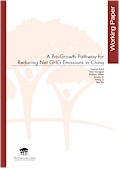| Working Paper Series |
 |
|
| Title | Pro-Growth Pathway for Reducing Net GHG Emissions in China | | Author | Fredrich Kahrl, Timm Tennigkeit, Andreas Wilkes, Xu Jianchu, Yufang Su and Mei Yan | | Year | 2009 | | Publisher | World Agroforestry Centre (ICRAF) China | | City of Publication | Beijing, China | | Series Number | Working Paper no 93 | | Number of Pages | 15 | | Call Number | WP0123-09 |
|
| Abstract: |
| •A focused programme to mitigate GHG emissions and sequester carbon in rural China could achieve an estimated net GHG emission reduction of 740 MtCO2 yr–1 from 2010-2030, equivalent to 14% of China’s 2005 CO2 emissions from energy use.
• Activities included in this rural climate programme would include: reducing the overuse of nitrogen-based fertilizers, encouraging rural households to replace inefficient burning of biomass with more efficient energy carriers, finding alternatives to agricultural residue burning, and sequestering carbon in agricultural soils, forests, and rangelands.
• All of the mitigation and sequestration activities we include in this paper have broader societal benefits. Reducing overuse of nitrogen fertilizers, for instance, could increase net incomes for farmers and improve water quality. Sequestering carbon in agricultural soils could increase soil fertility and moisture, increase agricultural yields and improve watershed functions.
• At an average abatement cost of $20 tCO2 -1, such a programme would require US$14.8 billion (104 billion yuan) per year in funding, equal to 0.3% of China’s GDP and 2.5% of government expenditures in 2008.
• A number of innovative mechanisms outside of public finance could be used to fund a rural climate programme, including the creation of a national offset programme or imposing a small fee on some emission intensive industrial sectors. For instance, funded as a carbon fee on China’s most carbon-intensive sectors, the cost to producers would be 1.1% of 2005 sales.
• Implementing a rural climate programme would require overcoming the human, financial, and technology constraints that have historically limited progress against policy goals for rural areas. For instance, extension agencies often lack the skills and funds to do what is currently asked of them, and extension would be even more important under a rural climate programme. Carbon revenues could play an important role in improving human resources, in encouraging adoption of practices and technologies, and in developing new technologies that overcome cost and scale hurdles. |
|